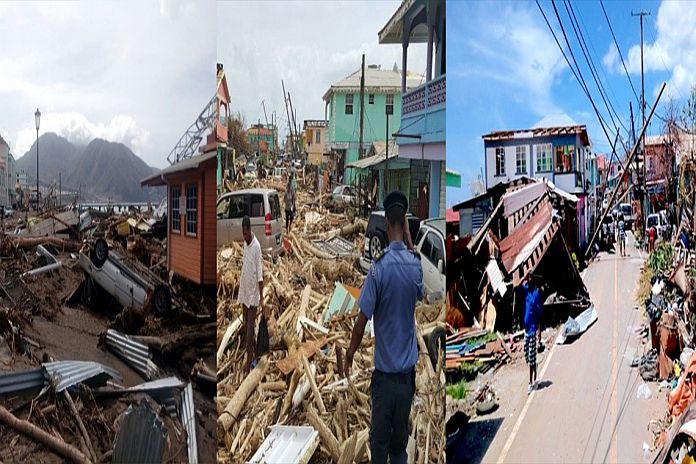By Tracey Marie Lane, Ruxandra Burdescu and Leah April
The coronavirus pandemic (COVID-19) has ministers of finance around the world grappling with a difficult question: how can they respond in a situation of fiscal stress? In the Latin America and Caribbean region, swift action seems to be lessening the severity of the health crisis, but the economic slowdown will exacerbate existing fiscal challenges. For example, last year in Tokyo, G20 Finance Ministers estimated that $176 billion will be needed by 2030 to reach universal health care for the world’s 54 poorest countries. In the aftermath of this global pandemic, financing needs like these will be considerably greater.
Finding fiscal resources to deal with shocks is always challenging, and there are trade-offs to saving for a rainy day. As one of the world’s most disaster-prone regions, the Caribbean faces frequent, often enormous economic shocks. Dominica lost 200 percent of its GDP when hurricane Maria hit in 2017; Grenada took an equally devastating hit from Hurricane Ivan in 2004. Caribbean ministers of finance have introduced policies to help build resilience to catastrophic events, which are now more frequent and intense due to climate change. Their efforts offer valuable lessons on how to mitigate the effects of shocks through more resilient public financial management (PFM) systems and processes.
In a crisis, countries need flexibility and accountability. Studies show that during crises, flexible and resilient PFM facilitates disbursement, coordination, and reallocation of public resources. At the same time, governments must ensure that fiduciary risks are managed and officials are held accountable. Budget systems and procedures should be responsive and flexible and ensure value for money, while minimizing corruption and fraud.
The fiscal response should be anchored in a disaster risk financing strategy. Many countries in the Caribbean have developed strategies with several key elements: risk analysis, data collection on losses, ways to leverage insurance, and options for managing contingent liabilities. In Grenada, the strategy includes allocating resources to budgetary reserves, establishing a contingency fund for emergencies, and having catastrophe insurance. Strategies can include stabilization funds for countries to save revenues from economic booms, such as Panama’s revenues from its canal or Uruguay’s from hydro energy generation. They can also set up natural disaster funds, to access under certain conditions.
Contingency funds require robust governance. Setting up a contingency fund as part of the country’s disaster financing strategy ensures preparedness and quick access to supplemental resources. Unlike other mechanisms, these funds can be accessed immediately to facilitate a rapid response. Emphasis on governance is essential to ensure transparency and accountability for crisis-related spending. If funds’ parameters are too narrow, health emergencies might not be included in the definition of natural disasters, and if too wide, they might be accessed too easily or serve political purposes. Reporting regularly on how funds are used lets citizens see who benefits and how; engaging civil society organizations is also useful.
In the Caribbean, the legal framework of contingency funds spells out when they can be used, and ensures links to the macro-fiscal framework, as well as alignment with debt sustainability objectives and any fiscal responsibility legislation. In St Vincent and the Grenadines, the framework specifies the objectives, rules for accumulating resources in the fund, alignment with fiscal rules, the periodicity of audits, and publication of the fund’s financial information on the government’s website. Jamaica’s post-disaster budget execution guidelines provide step-by-step instructions to help ensure that funds for disaster relief and recovery from the various financing instruments and sources available are accessed and disbursed as quickly and effectively as possible.
Each country can decide the levels of financing they need. Deciding adequate levels or types of emergency financing depends on each country and the opportunity cost. This should be spelled out in the disaster financing strategy. Finance ministers need to consider how to finance the funds and may earmark a specific revenue or, as in St Vincent and the Grenadines, a percentage of the VAT. Bank accounts can be established at the central bank, and a facility called a special purpose vehicle can be created. This reduces the risk of political pressure for diverting cash to other expenditures, with the trade-off of less flexibility for cash management in normal times.
In the aftermath of COVID-19, countries will need to prepare for the next crisis. The pandemic may weaken the revenue base, increase expenditures dramatically, and result in higher debt. There will be a long-term hit, particularly on oil and tourism revenues. Despite these challenges, the build-up of adequate fiscal buffers and the strengthening of PFM systems are key to an adequate response to future external shocks. As Caribbean countries know well, the question is not if there will be another emergency, but when.
COVID-19 is a public health emergency that will test the resilience of countries’ systems and institutions in unprecedented ways, demanding rapid and effective responses from both national and local governments. It is imperative for finance ministers to act urgently, with flexibility and transparency in the short term. Countries should also assess their long-term strategies to build fiscal buffers for responding to future emergencies.
![]()






